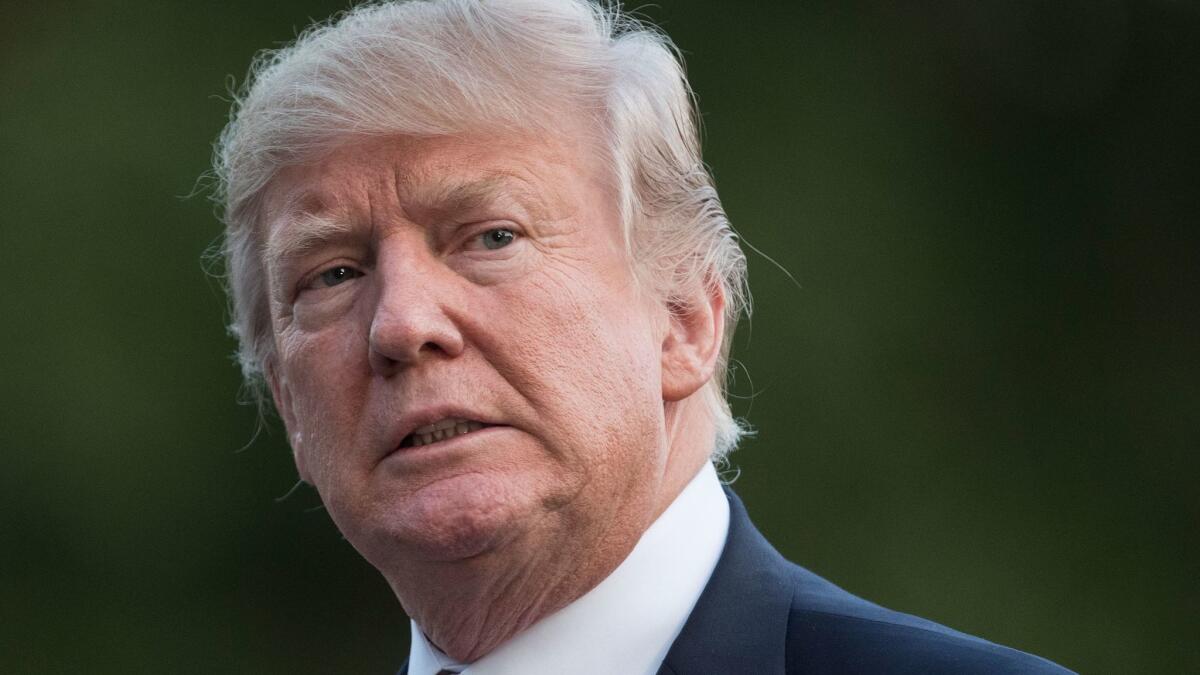Op-Ed: Trump is shedding supporters like no other president in modern history

- Share via
President Trump’s poll numbers are bad and getting worse. He began his presidency on shaky ground; on Inauguration Day, only about 45% of Americans said they approved of the job he was doing. Since then, it’s been a bumpy ride downhill. Last week, the Gallup Poll reported that Trump’s job approval had sagged to a low of 34%.
Other surveys’ findings are slightly less dire, but all show the same downward trend. No president has fallen so low in public esteem so early in his tenure in the history of modern polling.
Those aren’t the only daunting numbers Trump has had to contemplate. (He claims he ignores the polls, but often betrays his denials with complaints about specific surveys.) The president’s disapproval rating, the share of Americans who think he’s doing a bad job, rose above 50% faster than any of his predecessors’.
No president has fallen so low in public esteem so early in his tenure in the history of modern polling.
He has created, almost single-handed, an unusually passionate opposition: One poll found that almost twice as many voters “strongly disapproved” of his job performance as said they “strongly approved.”
And while Trump claims that his base of support remains impregnable, that’s proven to be a myth.
“The Trump base is far bigger & stronger than ever before,” the president claimed on Twitter this month.
But his own campaign pollster, Tony Fabrizio, reported numbers last week that show his base eroding. Trump’s support among Republicans and Republican-leaning independents, while still strong at 75%, has declined from earlier highs, Fabrizio said. (Even Trump can’t dismiss that one as a fake poll.)
It’s true that most of Trump’s most fervent supporters are still committed to him. But his less fervent supporters — let’s call them “soft Trump voters” — are drifting away.
The data site fivethirtyeight.com has been polling thousands of voters who supported Trump on election day, and has classified about 15% of them as “reluctant Trump voters” — people who went for Trump but said they were “not excited” about their vote. These reluctant Trump voters tend to be better-educated than the president’s hard-core supporters. They’re often independents or even Democrats, not committed Republicans.
This month, only 63% of them said they approved of the job Trump was doing as president. (Remember, they all voted for him in November.) When asked if they would vote for Trump a second time, only 48% said yes, and only 12% said “definitely yes.” That’s not a reliable prediction of what they’ll do in 2020 if Trump runs for reelection, but it’s a pretty clear sign of buyer’s remorse.
In another analysis, Ronald Brownstein of the Atlantic obtained detailed data from The Gallup Organization for Wisconsin, one of the states that put Trump over the top last year. He found that Trump’s backing among college-educated white voters had dropped to about 40%. Even more striking, he found that the president’s support among white voters without a college education — the working-class nucleus of his base — had sunk from 62% to 51%, about the same level of support they gave Mitt Romney when he lost in 2012. The dropoff was especially dramatic among women, Brownstein found.
Why are so many Trump voters edging away?
Pollsters who have conducted detailed interviews and focus groups say the most important factor may be that many have been disappointed by Trump’s failure to deliver on some of his biggest promises: new manufacturing jobs, a middle-class tax cut and lower healthcare costs.
Congress’ failure to repeal or replace Obamacare is a case in point. Soft Trump voters, including women, ranked healthcare as a high priority — higher than hard Trump voters, who cared more about immigration and terrorism. So Trump’s rage at the Republican-led Senate for its inability to pass a bill is not misplaced; the legislative debacle cost him support among the voters who helped him win.
The president’s decline in the polls isn’t irreversible. Bill Clinton suffered similar (if less acute) setbacks in his first year, but went on to win reelection easily.
“The key questions are: How many jobs are being created? And are wages going up? If those two things happen, his numbers are going to improve,” the GOP pollster Davod Winston told me. “He needs one big legislative outcome, like tax reform, to show that he has pushed things forward.”
Maybe. But that makes Trump’s decision to launch attacks on the leaders of his own party in Congress look counterproductive. A president with an approval rating below 40%, and a base that’s fraying, may find that he needs McConnell and House Speaker Paul D. Ryan as much as they need him. Many of those GOP senators are already running away from the president, calculating that they won’t need his help to win reelection.
Politics is about addition, not subtraction, an ancient campaign adage holds. Trump’s own polls show that he hasn’t learned that lesson. Or, at least, hasn’t learned how to put it into practice.
To read the article in Spanish, click here
Twitter: @DoyleMcManus
Follow the Opinion section on Twitter @latimesopinion or Facebook
More to Read
A cure for the common opinion
Get thought-provoking perspectives with our weekly newsletter.
You may occasionally receive promotional content from the Los Angeles Times.











